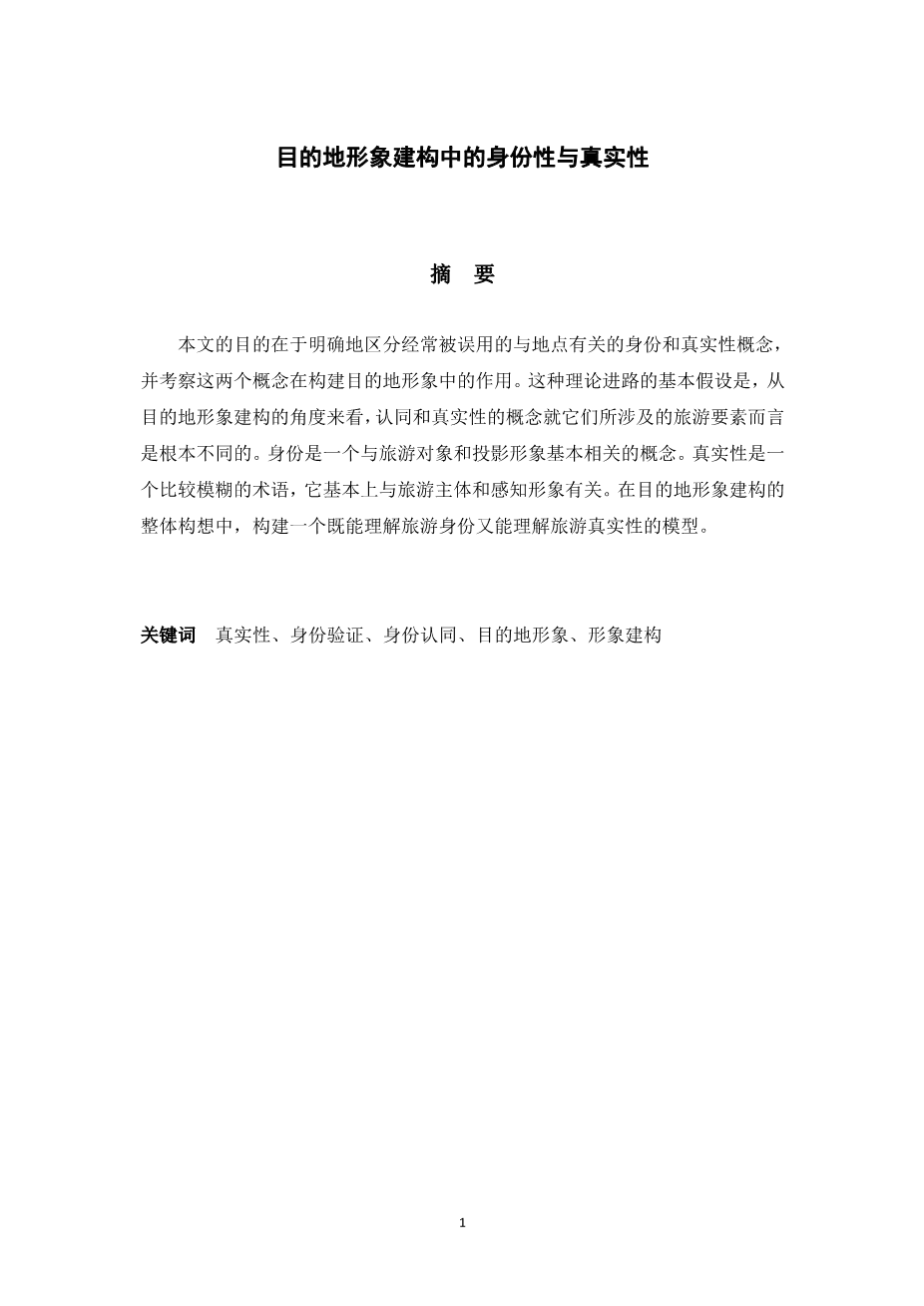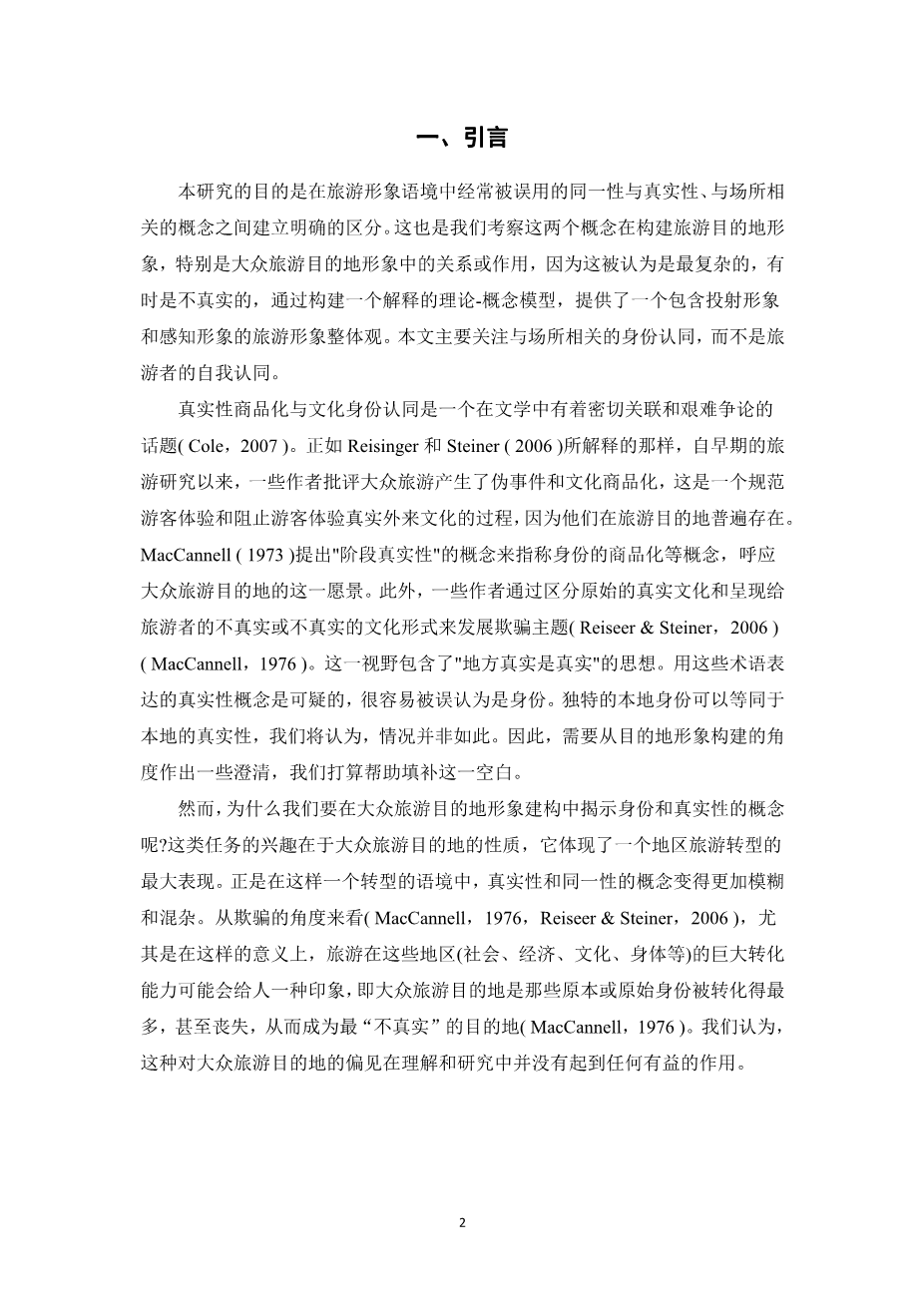Identity and authenticity in destination image construction
Abstract
The aim of this paper is to establish a clear distinction between the often misused concepts of identity and authenticity as related to place and also to examine the role that both concepts play in constructing destination image. The basic hypothesis of this theoretical approach is that the concepts of identity and authenticity are fundamentally different in terms of the tourist element they are related to, from the point of view of destination image construction. Identity is a concept basically related to the tourist object and projected image. Authenticity, a more ambiguous term, is basically related to the tourist subject and perceived image. A model is built to understand both tourism identity and authenticity in a holistic conception of destination image construction.
Keywords authenticity; authentication; identity; destination image; image construction
- INTRODUCTION
The aim of this study is to establish a clear distinction between identity and authenticity, as related to place, concepts which are often misused in the context of tourist image. It is also our aim to examine the relationship or the role that both concepts play in constructing the image of tourist destinations, particularly that of mass tourism destinations, since these are said to be the most commodified and sometimes inauthentic, by building an explanatory theoretical–conceptual model which provides a holistic view of tourist image encompassing both projected and perceived images. This paper focuses mainly on identity related to place, and not on touristsrsquo; self-identity, although the concept is mentioned later on.
The commodification of authenticity and cultural identity is a subject that has been closely related and arduously debated in the literature (Cole, 2007). As explained by Reisinger and Steiner (2006), since the early works on tourism, some authors have criticized mass tourism for generating pseudo-events and commodifying cultures, a process which standardizes tourist experiences and prevents tourists from experiencing authentic foreign cultures because of their prevalence in the destinations visited. This vision of mass tourism destinations is echoed by MacCannell (1973) who proposes the concept of “staged authenticity” to refer to concepts such as the commodification of identity. Moreover, some authors develop the theme of deception (Reisinger amp; Steiner, 2006) by distinguishing between a pristine authentic culture and an inauthentic or less authentic form of culture presented and performed to tourists (MacCannell, 1976). This vision encompasses the idea that local authenticity is destroyed through this process of commodification and globalization. The concept of authenticity expressed in these terms is
dubious and could be easily mistaken for identity. Unique local identity could be equivalent to local authenticity, which, we will argue, is not the case. Some clarification is therefore needed from the perspective of the destination image construct, and it is this gap that we intend to contribute to filling. Why, however, should we wish to shed light on the concepts of identity and authenticity within mass tourism destination image construction? The interest of such a task resides in the very nature of mass tourism destinations, which embody the maximal expression of tourism transformation in a territory. It is within such a transformative context that the concepts of authenticity and identity become more blurred and mixed. From the point of view of deception (MacCannell, 1976; Reisinger amp; Steiner, 2006), this is especially so in the sense that the enormous transformative capacity of tourism in such areas (socially, economically, culturally, physically, etc.) may give the impression that mass tourism destinations are those whose original or pristine identity has been most transformed, or even lost, and, consequently, as the most “inauthentic” (MacCannell, 1976). We consider that such prejudices concerning mass tourism destinations do not serve any useful purpose in understanding or studying them from the perspective of image.
II.Literature review
Image is a fundamental concept within tourism and an issue that has been repeatedly addressed in tourism-related literature. It is especially relevant to destination marketers and policy-makers as destination image has been found to be a key antecedent to tourist satisfaction with, trust in and attachment to the destination (Chen amp; Phou, 2013; Li amp;Yang, in press) and a significant element influencing destination loyalty and tourist decision-making (Liu, Li, amp; Yang, in press; Tavitiyaman amp; Qu, 2013; Zhang, Fu, Cai, amp; Lu, 2014). In this vein, some of the latest developments on this subject have focused on themoderating role of image in tourist satisfaction and behaviour (Li amp; Yang, in press; Liuet al., in press; Tavitiyaman amp; Qu, 2013), destination perceptions (Busby, Ergul, amp; Eng,2013), and on the relationship of destination image and product country image in the placeimage construct (Elliot, Papadopoulos, amp; Szamosi, 2013).
A.Image as a dialectic social construct
The approach adopted in this study considers that a tourist image is a complex construct(Elliot et al., 2013; Gallarza, Gil Saura, amp; Calderon Garcia, 2002) resulting from a dialectic relationship between the projected and the perceived images, that is, between the different agents and the tourists, between the object and the subject. Papson (1981) highlights the two-way mutual influence between projected and perceived images. Many authors, such as Mackay and Fesenmaier (1997) and Smith (2005), explain that tourist image is the amalgam of the projected and perceived images of a destination. The dialectic relationsh
剩余内容已隐藏,支付完成后下载完整资料


英语译文共 14 页,剩余内容已隐藏,支付完成后下载完整资料
资料编号:[405768],资料为PDF文档或Word文档,PDF文档可免费转换为Word
您可能感兴趣的文章
- COVID-19时期的旅游业和可持续发展:以西班牙为例外文翻译资料
- 农民相对剥夺感对乡村旅游可持续发展的影响机制外文翻译资料
- 校园大学生的旅行行为——以亚洲某乡村大学为例外文翻译资料
- 内容旅游与地方社区响应:鹫宫的“幸运之星”和“协作动漫旅游”外文翻译资料
- 基于符号互动理论的遗产旅游资源开发与重塑——以良渚古城遗址为例外文翻译资料
- 在TikTok上映射互联网名人:探索注意力、经济和可见性劳动力外文翻译资料
- 基于社区游客视角的环境责任行为的概念和度量外文翻译资料
- 温泉小镇的再造:维希的独特案例——副标题外文翻译资料
- 基于IP理念的桐乡丰子恺文化旅游开发研究外文翻译资料
- 特殊事件对旅游业的影响及其应对措施研究——新冠肺炎疫情对全球旅游业的影响及其应对措施外文翻译资料


